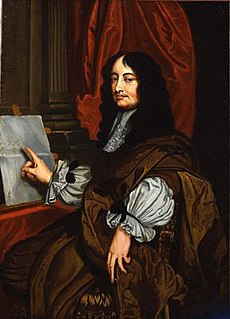Related Research Articles

William Brouncker, 2nd Viscount Brouncker, PRS was an English mathematician who introduced Brouncker's formula, and was the first President of the Royal Society. He was also a civil servant, serving as a Commissioner of the Royal Navy. He was a friend and colleague of Samuel Pepys, and features prominently in the Great Diary.
Sir Robert Moray FRS was a Scottish soldier, statesman, diplomat, judge, spy, and natural philosopher. He was well known to Charles I and Charles II, and to the French cardinals Richelieu and Mazarin. He attended the meeting of the 1660 committee of 12 on 28 November 1660 that led to the formation of the Royal Society, and was influential in gaining its Royal Charter and formulating its statutes and regulations. He was also one of the founders of modern Freemasonry in Great Britain.
The post of Lord President of Munster was the most important office in the English government of the Irish province of Munster from its introduction in the Elizabethan era for a century, to 1672, a period including the Desmond Rebellions in Munster, the Nine Years' War, and the Irish Rebellion of 1641. The Lord President was subject to the chief governor, but had full authority within the province, extending to civil, criminal and church legal matters, the imposition of martial law, official appointments, and command of military forces. Some appointments to military governor of Munster were not accompanied by the status of President. The width of his powers led to frequent clashes with the longer established courts, and in 1622 he was warned sharply not to "intermeddle" with cases which were properly the business of those courts. He was assisted by a Council whose members included the Chief Justice of Munster, another justice and the Attorney General for the Province. By 1620 his council was permanently based in Limerick.

The Gresham College group was a loose collection of scientists in England of the 1640s and 1650s, a precursor to the Royal Society of London. Within a few years of the granting of a charter to the Royal Society in 1662, its earlier history was being written and its roots contested. There is still some debate about the effect of other groups on the way the Royal Society came into being. The composition of those other groups is unclear in parts; and the overall historiography of the early Royal Society is still often regarded as problematic. But this group has always been seen as fundamental to the course of events.
References
- ↑ "Fellows of the Royal Society", Royal Society. "Fellowship from 1660 onwards" (xlsx file on Google Docs via the Royal Society)